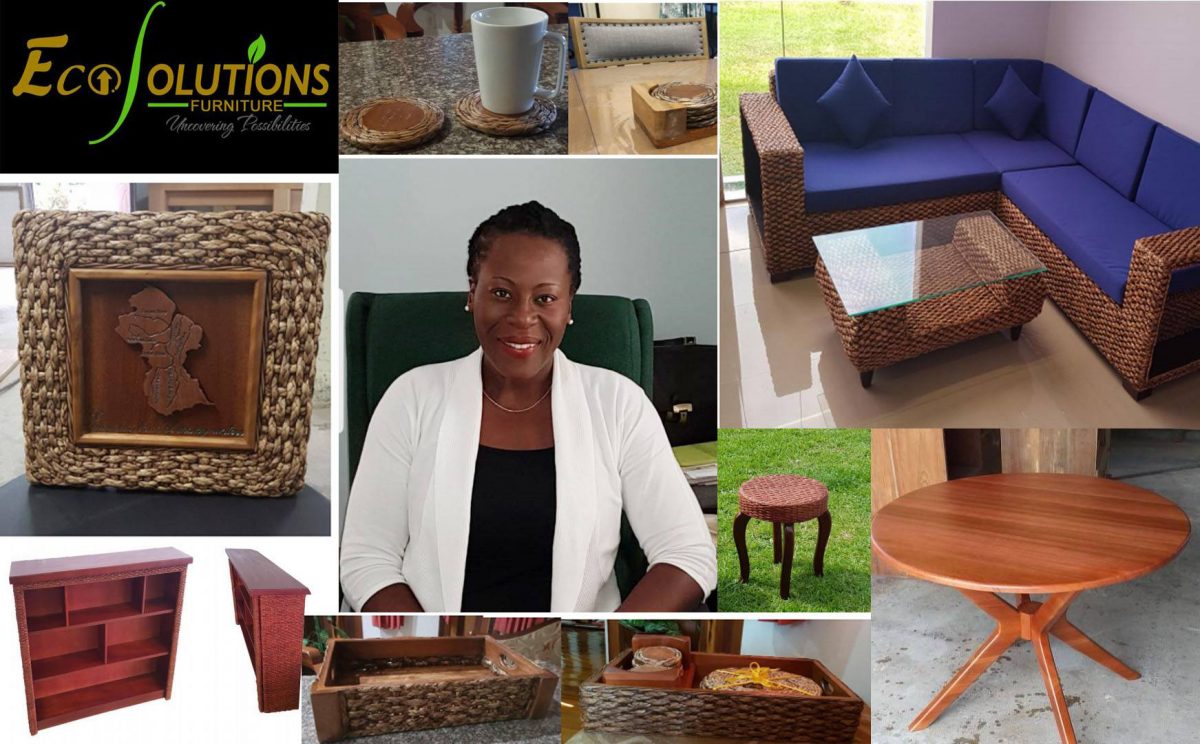Eco Solutions is one of the hundreds of manifestations of the considerable creative imagination of Guyanese women, reflected mostly in the agro-processing, craft, and furniture design sectors in Guyana. Their primary significance, up to this time, reposes in the truism that women have, over time, made a no less significant contribution to those sectors than their male counterparts.
The owner and director of Eco Solutions is an imposing-looking but amiable woman named Ndibi Schwiers-Ceres, who previously served as Director of the local Department of the Environment. The company’s promotional catalogue parades a number of eye-catching pieces of furniture, tastefully put together, and ‘decorated’ with local natural fibres that provide them with finishes that are, simultaneously, quaint and tasteful.
If their newness and novelty mean that they must take their turn for acceptance on the local furniture market, in a metropolitan environment regarded as more accepting of newness, they may well be rated as world class.
The brief internet promotional ‘write up’ on Eco Solutions describes the enterprise as “a woman-owned, hand-crafted furniture manufacturing company.” Arguably, it is more than that. It is, to a large extent, the unfolding manifestation of a mission which the owner of the company articulates in a language that appears to have its origins in beliefs that are more than marginally mystical.
Realising the outcomes anticipated by the creative imagination of the designers relies on the skills of joiners and weavers. After all, Eco Solutions is seeking the patronage of what, frequently, can be a brutally demanding market. Eco Solutions was born in 2015 out of what the owner says was “a desire to respond to the global call for action on climate change through green business innovation.” The company’s focus on innovation, she says, is linked to the transformation of coastal aquatic plants in Guyana into decorative parts of tasteful pieces that reflect a strong environmental sensitivity and which are designed to enhance the ambience of homes, offices, and business places. The essence of the marketability of Eco Solutions, Ndibi says, reposes in its “contemporary designs coupled with local knowledge of our skilled artisans.” These, she says, have combined to “create distinctive pieces of furniture which are both eco-friendly and elegant.”
Eco Solutions, Ndibi says, is committed to the creation of employment for vulnerable members of society, particularly women, to engender social change and improve their livelihoods. In pursuit of this mission, she appears driven, determined that even if Eco Solutions’ forward movement amounts to a single step at a time, there is only one direction in which it is going.
Recently, she parted company with her public sector job to throw herself into what appears to be an obsession rather than just a run-of-the-mill business pursuit. “Of course investment-related initiatives have a right to anticipate material returns. Right now, however, my focus is on the impact that our creations make on growing the establishment and creating a far greater demand than presently exists,” she says.
This year, the company’s focus is on creating enhanced awareness of and demand for the work of Eco Solutions through carefully planned product displays beginning in February. Inevitably, her focus collides with the ‘chops and changes’ in the behaviour of the coronavirus pandemic which has cast an imposing shadow over initiatives that involve significant public gatherings. That, however, does not deter Ndibi.
Products like those offered by Eco Solutions are yet to take hold in a market that has always been concerned mostly with the functional rather than the fancy. Here, the challenge for Eco Solutions is that of making a sustained pitch at what is still a steadily growing but still razor-thin market that is seen as dwelling, for the most part, within the financial comfort zone of affluent locals and some of the handful of personages that compromise the diplomatic community.
Part of Ndibi’s interview with the Stabroek Business addressed a possible shift in strategy to address considerations like consumer affordability and the creation of more modest but no less attractive pieces that might meet the affordability constraints of the market. She is altogether disposed to listening in what she sees as a ‘season’ during which she is determined to further popularise her work. “Ultimately, our expectation at Eco Solutions is that we not only make a profit but also that we are able to share with both the local and overseas markets the experience of what we create. We believe that there is a demand in the furniture market, both locally and internationally that derive from the natural fibre dimension to our creations and that will be a large part of the focus of our promotional push this year,” Schwiers declared.
Eco Solutions’ operating base is at Good Hope, East Coast Demerara. The director can be reached at 612-0827 or ecosolutionsfurniture@yahoo.com.
Pieces from Ndibi ’s creations will form part of the furnishing at the Pergola Stake House and Lounge Courtyard Mall, Robb Street, Georgetown, shortly.







